Tale of the century: How Yorkshire cricket legend Geoffrey Boycott hit the magic number
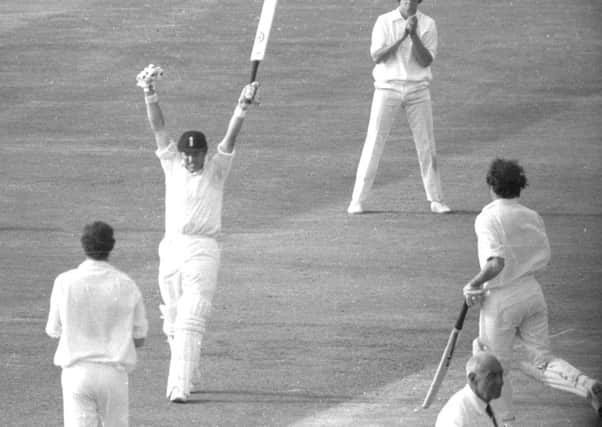

At the start of the 1962 season, the former Yorkshire batsman Ted Lester gave a young Geoffrey Boycott some simple advice. “If you get the chance, score centuries,” said Lester.
Not exactly rocket science but, as Boycott recalled in his autobiography, “it coloured my approach to batting”.
Advertisement
Hide AdAdvertisement
Hide AdBoycott added: “Good scores are always valuable but centuries stick in the mind; there are influential people who might not notice a good innings of 60 or 70 but they will react if you get a hundred.
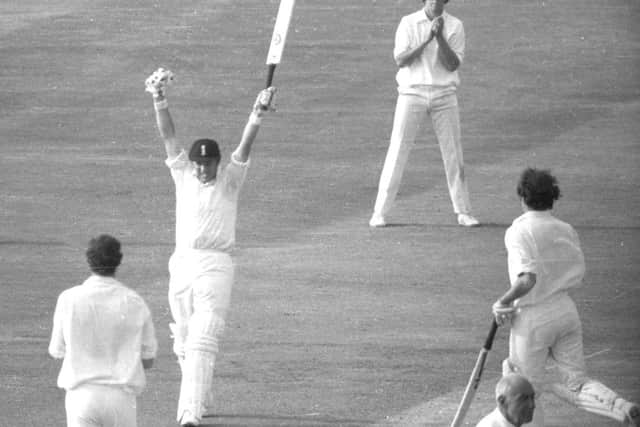

“I hadn’t thought about it in quite those terms but Ted was obviously right.
“The difference between a score in the 90s and a century is often reflected as the difference between failure and success. It may be illogical but a century in cricket has its own magic.”
During a career that ran from 1962 to 1986, Boycott experienced this magic 151 times.
Advertisement
Hide AdAdvertisement
Hide AdOnly Jack Hobbs (197), Patsy Hendren (170), Walter Hammond (167) and Phil Mead (153) have scored more hundreds in the game’s history.
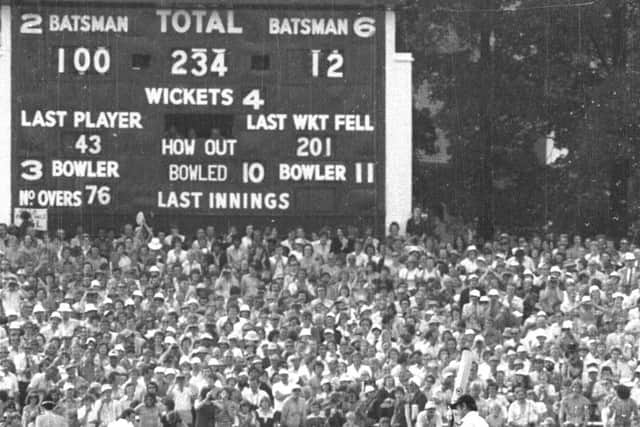

Boycott did not simply like scoring hundreds, he enjoyed it with a passion that surpassed mere pleasure.
To him, hundreds were the very oxygen of cricket; Boycott needed them almost in the way that the rest of us need oxygen.
The most famous of Boycott’s hundreds was, of course, his 100th, achieved 40 years ago today.
Advertisement
Hide AdAdvertisement
Hide AdOn August 11, 1977, he became the 18th man to reach the milestone and the first to do so during a Test match when he faced Australia on his home ground of Headingley.
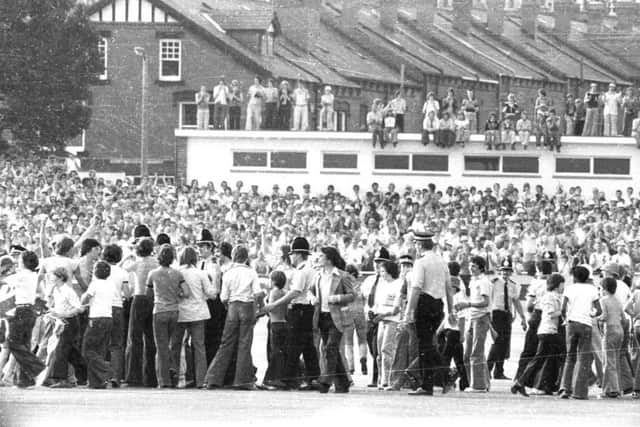

It seemed destined that Boycott should achieve his dream in front of his own crowd in a match in which England’s innings victory gave them the Ashes.
“It must have been written by someone, somewhere before I went into bat,” he said. “There is no other explanation for the memory and magic of it.”
Details of that day can be recited almost off by heart.
The shot with which Boycott reached three figures – a glorious on-driven four off Greg Chappell to the foot of the Rugby Stand – has been replayed so often that many cricket lovers can bring it to mind at a moment’s notice.
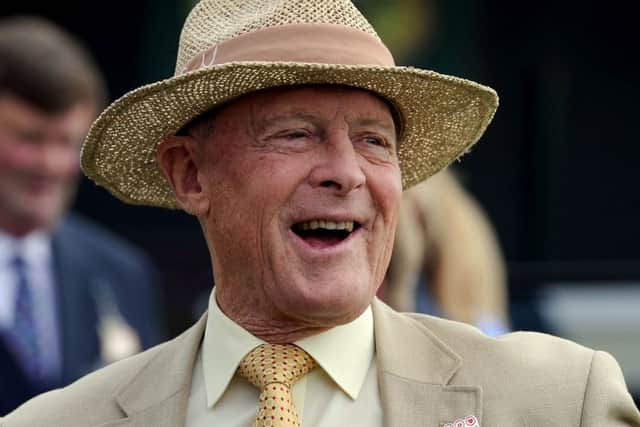

Advertisement
Hide AdAdvertisement
Hide AdInnumerable words have been written about the innings – not least in this newspaper, which carried an in-depth feature with Boycott only last September, when he recalled again the sleepless night beforehand, the expectation of the Yorkshire public, the fact that his Yorkshire team-mate Arnie Sidebottom had put a bet on him to get a century, and so on.
Boycott described it as “the greatest moment of my cricketing career” but reiterated his belief that his hundred in the previous Test at Trent Bridge was “my finest century”, as it followed his return to Test cricket after a self-imposed three-year exile and was achieved despite the fact that he ran out local hero Derek Randall.
Boycott’s 100th hundred, in fact, was merely the headline hundred in a remarkable career, one in which his other three-figure scores are often overlooked.
Heeding Ted Lester’s advice to a tee, it is doubtful whether anyone, in fact, has pursued centuries with the tunnel-vision purpose displayed by Boycott.
Advertisement
Hide AdAdvertisement
Hide AdHe had his critics, those who accused him of putting his own ambitions before those of the side.
However, it is interesting to note that only 12 of his 151 centuries came in a losing cause, while England lost none of the games in which Boycott made his 22 Test hundreds.
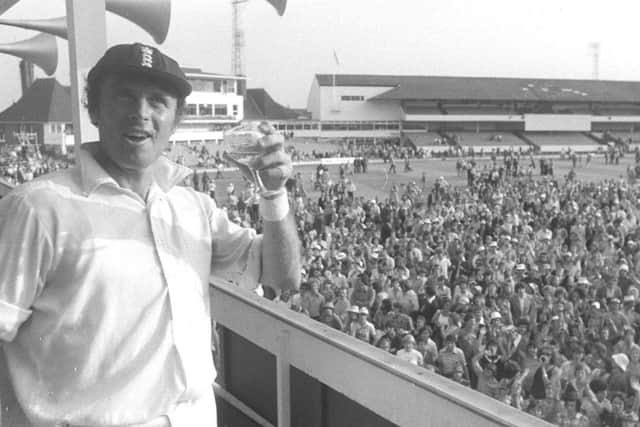

Boycott’s maiden hundred – with Lester’s words still fresh in his ears – was for Yorkshire against Lancashire at Sheffield in 1963.
He scored 145 before a crowd of 20,000 at Bramall Lane.
Batting at No.5, Boycott withstood everything that Fred Trueman’s England pace bowling partner Brian Statham could throw at him, with Boycott remembering the great sportsmanship shown by Statham, who acknowledged his best shots that day with generous words and even applause.
Advertisement
Hide AdAdvertisement
Hide Ad“It meant an enormous amount to me,” he said, as did the ovation of the Yorkshire spectators, with “people standing and cheering like mad”.
Boycott’s second century came in the return game at Old Trafford, where he hit 113 from the opening position that he would make his own.
Eight centuries followed in 1964, including Boycott’s first at Test level.
He hit 113 in the fifth and final Test at the Oval (the game in which Trueman captured his 300th Test wicket), having made 122 against the tourists for Yorkshire at Bradford the previous week.
Advertisement
Hide AdAdvertisement
Hide AdBoycott made his first double hundred in 1967 (although he was dropped for slow scoring after the innings of 246 not out against India at Headingley, “the deepest wound of my professional life”).
He picked himself up to score his first double century for Yorkshire a couple of weeks later, striking 220 not out against Northamptonshire at Sheffield.
The following winter, Boycott made his first double hundred overseas – 243 for the MCC against Barbados in Bridgetown.
By now, his thirst for runs – and centuries – was insatiable.
Advertisement
Hide AdAdvertisement
Hide AdIn 1970, Boycott made his highest score for Yorkshire – 260 not out against Essex at Colchester. He made seven double hundreds for the club and a further 25 scores of 150-plus.
Only Herbert Sutcliffe (112) has scored more first-class centuries for Yorkshire than Boycott, who made 103 of his 151 hundreds for the White Rose.
Boycott’s most productive century-making summer was in 1971, when he hit 13 on his way to averaging over 100, a feat he repeated in 1979.
Boycott achieved his career-best score in 1974 – 261 not out for MCC against West Indies Board President’s XI in Barbados.
Advertisement
Hide AdAdvertisement
Hide AdIt was one of 66 times that he finished unbeaten after making three figures, along with two occasions when he retired not out.
Boycott’s 100th hundred for Yorkshire came in his penultimate season in 1985, when he hit 103 not out against Warwickshire at Edgbaston.
The last of his centuries was in July 1986, an innings of 135 not out against Surrey at Headingley on his penultimate Championship appearance.
Lester’s words - “if you get the chance, score centuries” – seem faintly amusing from this distance.
Advertisement
Hide AdAdvertisement
Hide AdThey were a bit like someone advising a young Denis Law, of Boycott’s favourite football team, Manchester United, to stick the ball in the back of the net as often as possible.
Like Law, Boycott needed no second invitation to do what he always did best.
For, as he proved at Headingley 40 years ago today, Boycott was in his element when it came to scoring centuries.
Boycott in his own words on his 100th hundred...
“The most amazing thing was that people expected me to do it. When the Yorkshire public came, they all just assumed and presumed that I’d do it. For me, that was the greatest compliment.
Advertisement
Hide AdAdvertisement
Hide AdThey’d seen me get so many hundreds and play so many innings for Yorkshire, that they thought it was automatic. Seventeen guys had got 100 hundreds before me, but I was the first one to do it in a Test match.
I didn’t think the odds were too good - if many of the great players before me hadn’t done it, so much greater than me - then you think, ‘Oh no, this is a bit tough.’
I didn’t sleep before the game. I was up at four in the morning, hot in the hotel room, asking the porter to sort out the air con. Normally, I was a very good sleeper and always got eight hours.
I was late for nets, and I was never late. By the time I parked my car and got changed, Keith Boyce, the groundsman, was taking the nets down.
Advertisement
Hide AdAdvertisement
Hide AdWhen I scored the boundary off Greg Chappell to bring up my hundred, it was a fantastic feeling.
Graham Roope, the non-striker, had to jump out of the way of the ball. He always said to me, ‘What would have happened if I hadn’t have jumped out of the way and you’d have got out next ball without getting a hundred?’
I said, ‘The Yorkshire public would have strung you up!’”